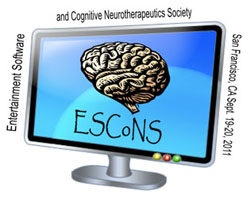ESconS, CBI and Education
Having a background as a middle school teacher for fourteen years, with an MS in Instructional Technology, Beth Rogowsky is thrilled about ESCoNS. The newly formed organization allows researchers like herself, from around the world, to come together to study how the brain changes in response to computerized training. After finding out about the society from Paula Tallal, she remembers thinking, "FINALLY! Gaming, computer-science and education unite!" According to the Pew Internet and American Life Project, 21 million or 87% of those aged 12 to 17 use the internet and 11 million of them go online daily (Lenhart, Madden, Hitlin, 2005). Eighty-one percent of teen internet users play games online which represents 17 million gamers. The high percentage of teens using the internet presents educators with an unprecedented opportunity -- to develop computer-based educational instruction in a gaming format.
In the school where Rogowsky taught, teachers are using a district-purchased CBI called Fast ForWord. The program is designed to improve students' cognitive and literacy skills. Now, with the creation of EsCons, she can share her research with other interested scientists, educators, and people in the entertainment software industry. Members of ESCoNS hope to use this organization to create more effective computer games using
advances in cognitive neuroscience to improve learning, and to develop
interventions for a variety of mental and neurological disorders. Beth Rogowsky concludes, "The game manufactors have so much to offer education." Reciprocally, educators and cognitive scientists have a great deal to offer gamers in helping them make games that are not only engaging and motivating, but potentially cognitively enhancing as well. Beth Rogowsky concludes, "These are exciting times, indeed." More about ESCoNS Specifically, ESCoNS hopes to:
|
 TDLC member Beth Rogowsky, a Post Doc at Rutgers University, recently won the People's Choice Award for a poster she presented at the ESCoNS (Entertainment Software and Cognitive Neurotherapeutics Society) conference in September 2011. The study found that 6th grade students, whose standard language arts curriculum was supplemented with CBI training
TDLC member Beth Rogowsky, a Post Doc at Rutgers University, recently won the People's Choice Award for a poster she presented at the ESCoNS (Entertainment Software and Cognitive Neurotherapeutics Society) conference in September 2011. The study found that 6th grade students, whose standard language arts curriculum was supplemented with CBI training